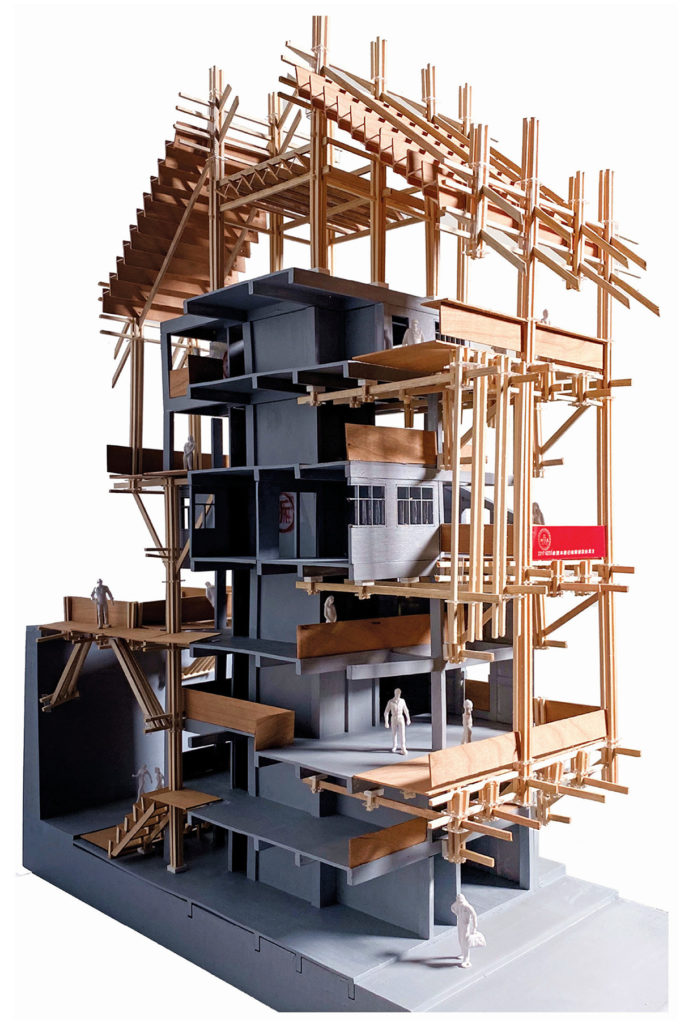A Scaffolding System Adapted for Double Aging | FAP 2023 Third Place
September 20, 2023
CHALLENGES
The entry posited that Hong Kong is facing a ‘double aging’ issue of both buildings and people. The Hong Kong Population Projections 2020–2069 report by the Census and Statistics Department of the Hong Kong Special Administrative Region Government has recorded that 18.3 per cent citizens are over 65 years old.
Census and research have predicted that the bulge of the largest age cohort (50–54) is projected to move upwards (80–84)—a dramatic change of 35 per cent by 2069 with 11.5 per cent of them over 85 years old. Research has also predicted that the elderly support ratio will be greatly reduced from 3.93 (2018) to 1.48 (2066). The building stock is also facing an aging situation. In 2019, 5,000 out of 24,000 domestic/composite buildings (20 per cent) were over 30 years old and in dilapidated conditions. Furthermore, most of them are reinforced concrete structures and designed to have a serviceable life of around 50 years. Thus, it is estimated that the number of dilapidated buildings will reach 10,000 (40 per cent) by 2046 if no remedial action is taken.
With the city’s ever-increasing demand for spatial density, the number of aging buildings becoming obsolete, as they await redevelopment, is also on the rise. The process of urban renewal by land acquisition takes approximately 10 years.
SOLUTION
The team aims to turn such an obsolescence ‘model’ on its head, as a critique of the wastefulness of demolishing buildings before their expiry date, by proposing a system of transitional wooden scaffolding kit-of-parts that redefines the existing concrete structure framework. The modular kit-of-parts system also means the parts can be prefabricated and assembled on-site.
By calibrating the existing structure to a broad spectrum of spatial and programmatic possibilities for both junior and senior citizens, it aims to extend the buildings’ ‘afterlife’ and reduce waste in both space-time and material terms. The design also seeks to contribute to Nature and community by having greenery at multiple levels and voided areas for the wind path to alleviate the urban heat island effect. It is a ‘soft’ process of negotiating urban redevelopment between the government, developers and owners, versus the ‘hard’ measures that typically force residents out. The team proposes their methodology could lead to economic empowerment for the residents as they take part in the regeneration process, against gentrification that is often present in most conventional renewal projects.
The site in question is in the west of Hong Kong Island—as the area shows a high number of 30 to 49-year-old private buildings—specifically at Water Street (a street in Sai Ying Pun) with 19.5 per cent of the population over the age of 65, similar to the city’s census of the same age group. The design aims to extend the building life by adding on structure and amenities for adaptable use, enabling cross-generational living in the community.
[This is an excerpt. Subscribe to the digital edition or hardcopy to read the complete article.]
PROJECT DATA
Location
Sai Ying Pun
Country
China
City
Hong Kong
Site Area
Over 1,000 square metres
Census

FUTURARC PRIZE 2023: THIRD PLACE

Alvin Kung, Jonathan So, Zachary Wong and Dicken Poon form a multidisciplinary team of architects, an analyst, a researcher, and a lecturer based in Hong Kong. This team shares a spectrum of design visions and capabilities, from local culture, global social concerns and urban design to theatre specialisation, sustainable architecture and BIM. Years after winning FuturArc Prize (Student category) in 2010, Alvin collaborated with the team on the “Transitional Scaffolding System for Urban Empowerment and Regeneration”, which is an extension of Jonathan’s research and design project. The manifesto aims to address the double-aging issue and promote well-being in Hong Kong.
FuturArc Prize 2024: Architecture for Life After … is open for entries! Register now on FuturArc App!

⠀
Read more stories from FuturArc 3Q 2023 Green Awards: Cross-Generational Architecture!

To read the complete article, get your hardcopy at our online shop/newsstands/major bookstores; subscribe to FuturArc or download the FuturArc App to read the issues.
Previously Published Main Feature
Contact us at https://www.futurarc.com/contact-us for older commentaries.

